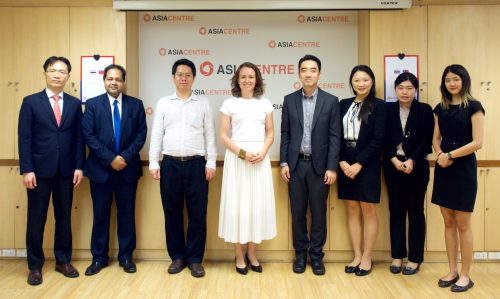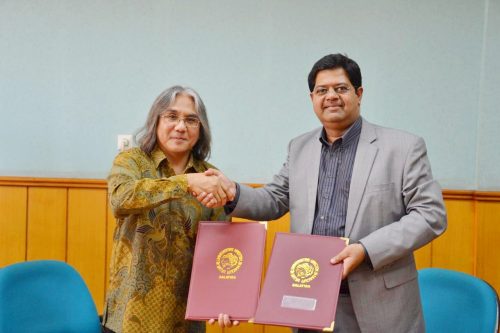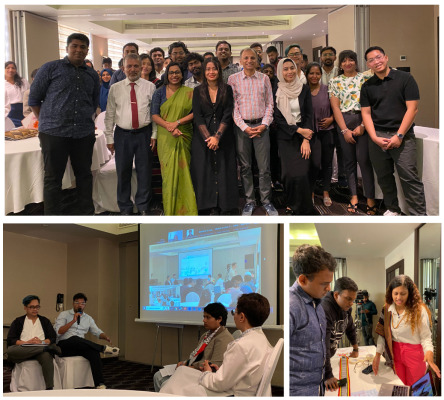
Introduction
Under the theme “#NoFilter: The Asian Youth and Emerging Realities of the 21st Century,” the Assembly provided a platform for young leaders to discuss and strategise around pressing social issues, including intersectional inequalities, climate change, civic space restrictions, and digital justice.
The 2025 Oxfam Asia Youth Assembly, held on 6-7 March, 2025, in Colombo, Sri Lanka, brought together 47 in-person youth participants from Sri Lanka and 30 virtual attendees from across Asia. Co-organised by Oxfam, Asia Centre, and DevPro, the event marked the culmination of the 2024 Oxfam Asia Young Leaders Fellowship Programme.
The event was structured over two days:
- Day 1 was a hybrid event, featuring an opening ceremony, three talk shows, and the drafting of a Youth Statement—a collective call to action reflecting participants’ concerns, aspirations, and policy recommendations for social development in Asia.
- Day 2 was an onsite workshop, bringing together the eight Oxfam Fellows and 25 in-person youth participants. The workshop focused on equipping youth with practical tools and techniques for effective advocacy and social change.
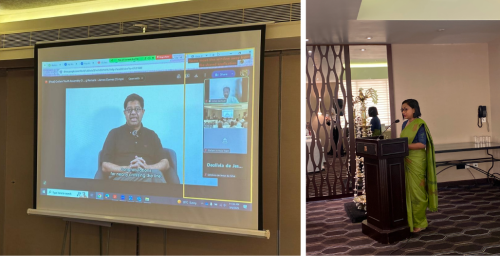
Day One Opening Ceremony
The first day of the Assembly, 6 of March, opened with a vibrant welcome ceremony, featuring a performance by the Sri Lanka Youth Performers Group. John Samuel, Oxfam Asia Regional Director, then welcomed participants, setting the stage for the discussions ahead. This was followed by a welcoming message from Dr. James Gomez, Asia Centre’s Regional Director, who congratulated the Oxfam Fellows on their amazing accomplishments while cautioning of the challenges that youth programmes may face in the future, especially with the halting of USAID. Tilak Karunaratne, Executive Director of DevPro, reflected on the longstanding partnership between DevPro and Oxfam, emphasising their shared commitment to fighting poverty and inequality.
The highlight of the ceremony was a keynote address by the Guest of Honor, Hon. Dr. Kaushalya Ariyarathne, Member of Parliament, introduced by Vishnu Padmanabhan. As both a university lecturer and policymaker, she delivered a compelling speech on the crucial role of youth in leadership and decision-making. She emphasised the dangers of an apolitical mindset among young people, urging them to stay informed, engaged, and passionate about driving change.
The opening also introduced the Oxfam Young Leaders Fellowship Programme, showcasing the journey of the eight Oxfam Young Leaders and unveiling a Youth Exhibit, where participants could engage with advocacy materials and projects.
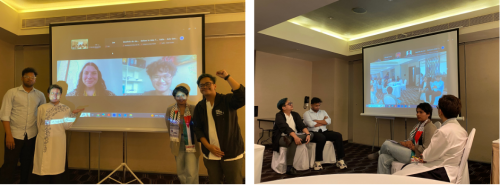
Talkshow Sessions: Engaging Dialogues on Key Youth Challenges- Day 1
The first talk show, “Intersectional Inequalities,” featured five regional speakers who discussed various forms of oppression, their complexities, and the crucial role of youth engagement in addressing these issues across different realms.
- Alanna Inserra, a Senior Social Development Specialist from the Asian Development Bank in the Philippines, kicked off the talkshow by emphasising the importance of youth engagement, and highlighting the need for skills development, mentorship, and financial support to strengthen youth programmes.
- Lance Dublin, a student from Mindanao State University, Philippines, reflected on what intersectionality means and the pathway to transformative change through the development of policies and programmes that recognise intersecting identities.
- Bhawana Ghimire, an Oxfam Fellow from Nepal, discussed the concept of gender as a social construct and highlighted the harmful implications of these norms and societal expectations, specifically on young women.
- Minh Ha Nguyen, an Oxfam Fellow from Vietnam, discussed the widespread issue of gender-based violence in the country, highlighting how the existing punitive system focuses on punishment rather than rehabilitation and fails to address the root causes of the problem.
- Achmad Zulfikar Luthfi, an Oxfam Fellow from Indonesia, stressed the importance of inclusive and responsible business practices in bridging not only economic inequality but other forms of inequality as well.
This session reinforced the urgent need for institutional and financial support to empower young people in overcoming systemic barriers.
Talkshow 2: Climate Change and Constrained Civic Space- Day 1
The second talkshow, “Challenges on Climate Change and Constrained Civic Space” featured five speakers who examined the impacts of climate change and shrinking civic space on youth activism.
- Dr. Thusitha Sugathapala, a Senior Technical Expert on Climate Change and Sustainable Development at SLYCAN Trust in Sri Lanka, emphasised climate change as a pressing issue, particularly for youth, who will bear the brunt of its impacts. He also highlighted the increasing inaction by governments and the challenges young people face in addressing climate change due to conventional top-down, government-centered approaches.
- Tan Darien, Co-Founder of a youth organisation that supports women and LGBT+ rights in Vietnam called Savour, spoke on his own experience as a youth leader. He noted three challenges for youth-led organisations: lack of funding, lack of mentorship and expertise, and administrative barriers. He advocated for increased funding, expanded capacity-building programmes to equip youth with essential skills, and greater networking opportunities to enhance youth leadership and engagement.
- Isaura Barros, an Oxfam Fellow from Timor-Leste, highlighted the country’s extreme vulnerability to climate change and that many young people remain unaware of its impacts, despite experiencing them daily. She emphasised the importance of youth-led initiatives—such as educational seminars, mangrove reforestation, and waste management projects—in raising awareness and fostering active engagement among young people.
- Seena Kimhohiching, an Oxfam Fellow from Manipur, India, shared her personal journey of resilience as a religious and ethnic minority. She delivered a powerful call for international action against the ongoing violence in Manipur, urging global attention and accountability for government officials.
- Jonathan Gelogo, an Oxfam Fellow from the Philippines, began his session with an interactive activity where participants had stickers placed on their foreheads and had to find their respective groups without speaking. Despite the lack of verbal communication, participants successfully identified their groups, demonstrating the power of nonverbal understanding. Jonathan linked this exercise to peacebuilding efforts, emphasising the importance of active listening, community engagement, and collaboration in fostering meaningful change.
The session highlighted the critical role of youth in climate advocacy and the need for more inclusive civic spaces where young people can participate in advocacy and decision-making.
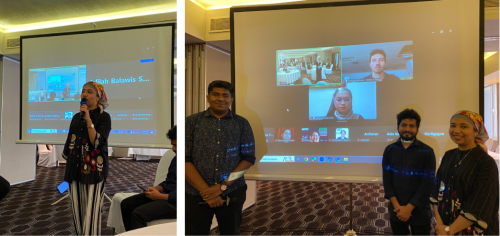
Talkshow 3: Digital Security and Data Justice – Day 1
The final talkshow, “Digital Security, Data Justice, and Digital Advocacy Challenges,” included five speakers and tackled the digital landscape in Asia, featuring discussions on misinformation, digital rights, and online advocacy.
- Lorenzo Urbinati, a Strategic Advisor for Oxfam International, emphasised the growing threats to digital security. He highlighted how internet shutdowns and digital surveillance not only undermine freedom of expression but also have real-world consequences, potentially endangering lives in critical situations.
- Dulanjaya Mahagamage, the Social Media and Research Manager at Hashtag Generation, explained how social media monitoring and data analytics can be a powerful tool used to track political discourse and combat misinformation.
- Jalilah Balawis Sarip, a dedicated member of the Youth Chain of Peace at Mindanao State University in the Philippines, stressed that digital security goes beyond protecting data—it is about safeguarding lives. She called for stronger digital security measures and the amplification of marginalised voices on media platforms to ensure greater inclusivity and protection in the digital space.
- Vishnu Padmanabhan, an Oxfam Fellow from Sri Lanka, observed that many young people in Sri Lanka lack access to practical digital security education and often have to teach themselves. He emphasised the need for integrating digital security into youth education.
- Mehrosh Zahid, an Oxfam Fellow from Pakistan, highlighted the widespread prevalence of both misinformation and disinformation in Pakistan and their significant threat to democratic values.
The speakers emphasised that digital security is not just about protecting data—it is about protecting lives and democratic freedoms.
Youth Statement & Closing Remarks
Following the panel discussions, participants took part in interactive breakout sessions to draft a Youth Statement, a collective call to action. They were divided into five groups, each focusing on a specific topic: Inequalities in Access to Health, Education, and Employment; Inequalities in Gender and Women’s Empowerment; Climate Change; Civic Space and Peace-Building Challenges; and Digital Justice and Digital Advocacy.
Within these groups, participants brainstormed ideas, identified key challenges, and developed actionable solutions. The resulting document captured their shared concerns and outlined concrete recommendations for policymakers and stakeholders. Once the Youth Statements were finalised, a representative from each group presented their insights and proposals, sharing their perspectives on the issues and the changes they hope to see.
The first day concluded with closing remarks from Oxfam, Asia Centre, and DevPro, followed by the presentation of Graduate Certificates to the eight Oxfam Young Leaders in recognition of their achievements. As a final highlight, a testimony video from youth participants was featured under the campaign #Nofilter, capturing raw, unscripted reflections and experiences from participants.
Day Two – Workshop
On 7 March, 2025 the second day of the Oxfam Asia Youth Assembly continued in Colombo, Sir Lanka bringing together 27 youth from across the country for an enriching workshop. The focus shifted to practical tools and strategies for youth advocacy, economic inclusion, and sustainable development, building on the discussions from Day 1.
Day 2 began with opening remarks from key speakers who set the stage for the day’s discussions. Mustafa Talpur, Oxfam in Asia’s Regional Advocacy and Campaigns Lead, welcomed participants and introduced the event’s focus on tools and techniques for driving change. Tilak Karunaratne, Executive Director of DevPro, highlighted social and economic challenges in Sri Lanka, including poverty, gender-based violence, and exclusion from economic opportunities, while also showcasing DevPro’s initiatives in women’s empowerment and economic inclusion. Kartini Sunityo, Asia Centre’s Partnership Manager, encouraged attendees to seize new opportunities and push their boundaries, while Vishnu Padmanabhan, an Oxfam Young Leader from Sri Lanka, emphasised the importance of continued collaboration and expressed appreciation for the collective efforts of all participants.
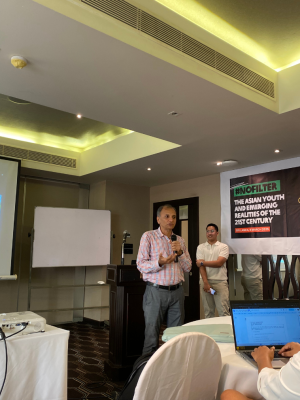
To kick off the workshop, Mustafa Talpur defined advocacy and introduced a video on digital influencing strategies. Participants then applied these insights by creating social media posts about the previous day’s Youth Assembly.
Next, Sheila Manokaran, Co-Founder of River Valley Irregulars (RVI), spoke about her organisation’s initiatives to amplify youth voices. She highlighted RVI’s workshops, internships, and other opportunities designed to empower young people, sharing real-life examples of their positive impact on youth development.
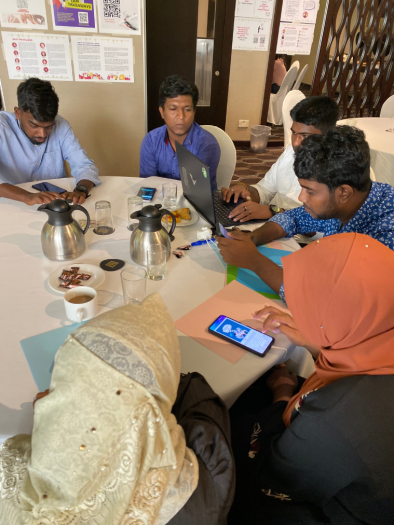
Day 2 concluded with a “Digital Advocacy Campaign Creation” group activity, where youth participants split into five teams to develop social media advocacy campaigns addressing key issues in Sri Lanka. Guided by one or two Oxfam Fellows per group, participants selected the following topics: Unemployment, Lack of Digital Literacy, Pollution, and Drug Addiction. Each team analysed their chosen issue, designed an advocacy post, and developed a campaign strategy. The activity wrapped up with a youth representative from each group presenting their campaign and proposed outreach strategy.
Conclusion
The 2025 Oxfam Asia Youth Assembly served as a powerful platform for youth empowerment, equipping young leaders with the knowledge, skills, and networks needed to drive meaningful change in their communities. Over two days, participants engaged in thought-provoking discussions, interactive workshops, and hands-on advocacy activities, tackling key issues such as intersectional inequalities, climate change, civic space, and digital justice.
The first day provided an opportunity for in-depth dialogue on the challenges youth face in the region, culminating in the drafting of a Youth Statement, a collective call to action addressing policymakers and stakeholders. The second day shifted focus to practical skill-building, ensuring participants walked away with the tools and strategies to translate their ideas into action.
Beyond discussions and activities, the Assembly fostered a strong sense of collaboration and solidarity among young changemakers. By bringing together youth from diverse backgrounds, the event emphasised that youth voices are not just important—they are essential in shaping the future of social justice, advocacy, and policy in Asia.
As the Oxfam Young Leaders Fellowship Programme comes to a close, the impact of this Assembly will extend far beyond the event itself. The ideas shared, connections built, and initiatives launched will continue to inspire youth-led activism, policymaking, and community-driven solutions in the years to come.
If you want to catch a glimpse of the event, here is the link to the Asia Centre’s TikTok summary of the Youth Assembly.


